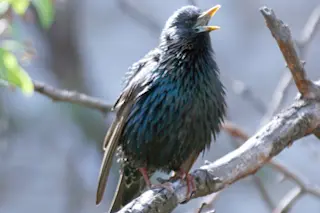Noam Chomsky, that noted linguist, has theorized that one of the main hallmarks that distinguishes human language from the squeaks and rumblings of birds and beasts is the ability to use something called recursive grammar. Essentially, recursive grammar is what enables us to insert an explanatory clause in the midst of a sentence, such as the 'that noted linguist,' in the preceding sentence.
Now a team of zoologists and psychologists led by University of California at San Diego's Timothy Gentner has shown that the lowly European starling is also quite capable of using this kind of syntax.
Gentner created sixteen artificial starling songs that followed two different patterning rules – a human-type song which had a clause inserted in the middle of an acoustic note string and another animal-type song with a clause only at the very beginning or end of the string. Gentner then played his repertoire to a ...















